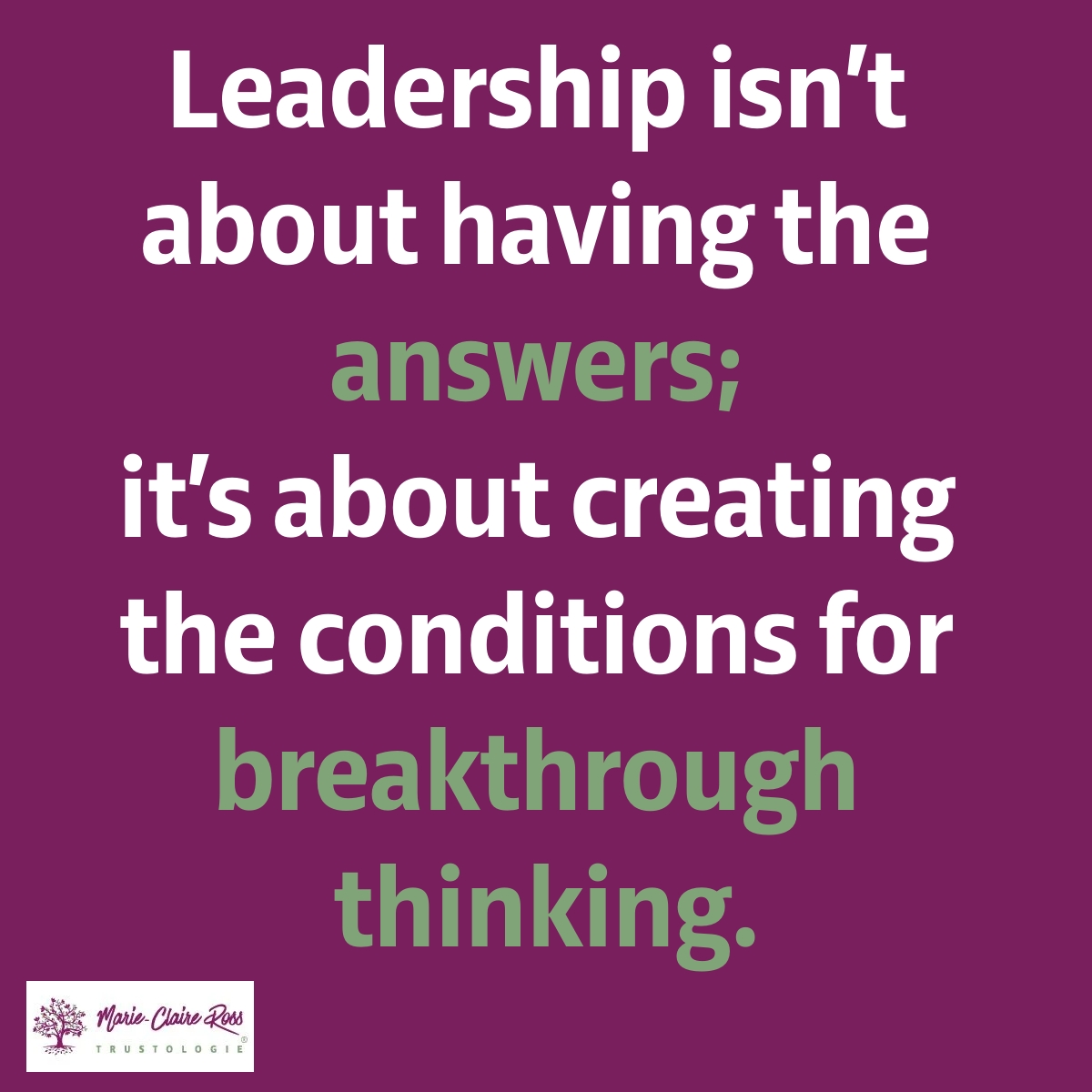8 min read
Beyond the "Why": 5 Coaching Secrets to Unlock Curiosity in Leadership
When my daughter was 17 months old, she discovered a superpower: the word “Why?”For the next two years, it was her response to almost everything.
Develop leaders, strengthen executive teams and gain deep insights with assessments designed to accelerate trust and performance.

Transform how your leaders think and perform with keynotes that spark connection, trust and high-performance cultures.

Explore practical tools, thought-leadership and resources to help you build trusted, high-performing teams.

Trustologie® is a leadership development consultancy founded by Marie-Claire Ross, specialising in helping executives and managers build high-trust, high-performing teams.

3 min read
Marie-Claire Ross : Updated on August 1, 2021

You can tell whether a man is clever by his answers. You can tell whether a man is wise by his questions.
Naguib Mahfouz
One of my favourite leadership practices is asking active questions. It might sound really basic, but it is one of the distinguishing characteristics of a high trust leader. They ask questions, rather than jump to conclusions or offer unsolicited advice. It is key to fostering high-impact conversations.
Robert Bales, one of the first scientists to study group communications, discovered that while questions comprise only 6% of verbal interactions, they generate 60% of subsequent discussions.
The benefits of asking incisive questions are countless. First of all, it improves the quality of your leadership. Ensuring that you stay present, which makes others feel heard and valued. This works toward forming deeper bonds with your direct reports and building trust. It also helps team members form bonds with one another, as they listen to one another’s issues and progress.
Incisive questions also encourage others to generate new ways of thinking or looking at an issue. Rather than the fairly typical practice of people advocating or agreeing that often leads to groupthink.
Not only that, asking great questions gives you more of an intuitive feel for the business. Helping you make more informed decisions. It also fosters commitment and passion in staff that makes them more likely to follow you during change and uncertainty.
It also trains people to ask other team member’s questions. Reducing time wasted through people trying to work it out themselves or pretending they know the answer. But it also creates the necessity for voice sending a subtle message that people’s voices are important because you are expecting an answer.
Furthermore, the more your subordinates get used to being asked questions, the more likely they will be to stop requiring excessive direction and approval. They stop people being order takers and figuring out things on their own. Gaining the confidence to trust themselves to solve problems and take the initiative.
One of the challenges with being a leader is avoiding the belief that you have to have all the answers. There are so many unknowns and so much uncertainty. Leading by asking questions models to your direct reports that even during a crisis, you can calmly address an issue through asking deep questions and keeping the lines of communication open.
You want to make sure that you ask questions in a way that enables people to feel heard, valued and appreciated. Often, I find leaders struggle with asking questions because they miss important steps.
Here are some important tips to help you ask questions more effectively:
Learning to have genuine conversations builds human connection ensuring that your direct reports and peers feel supported. It's about sending the message that you aren't always right or don't know what's the best way forward, but you are willing to invite other people's contribution.
Helping people move out of their own comfort zone into the achievement zone. Working with others to be their best.

8 min read
When my daughter was 17 months old, she discovered a superpower: the word “Why?”For the next two years, it was her response to almost everything.

11 min read
I have a friend who often finds herself at the mercy of her emotions. Recently, she called me to rehash a confrontation she’d had with a group of...

9 min read
True leadership presence isn’t a performance or a set of charisma hacks; it is the felt experience of who you are being in the room. By cultivating...

When it comes to writing or talking about safety, safety leaders often assume that they know what techniques to use to influence and engage others...

Call it fear of looking stupid or fear of not fitting in right, for some reason we when work in corporate jobs, we speak like, well, robots.